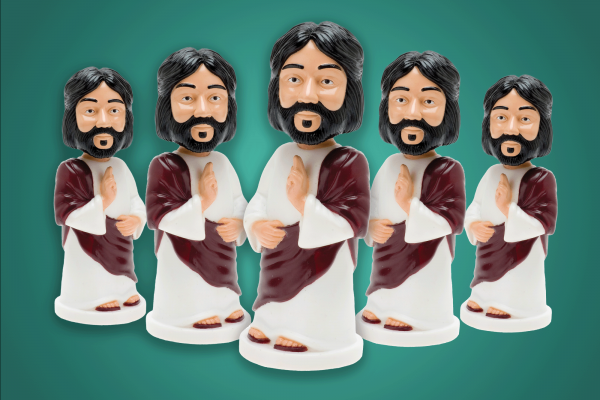DESPITE WHAT DASHBOARD Jesus figurines might suggest, there is no plastic in the Bible. None. It’s a 100 percent plastic-free zone. Jesus does, however, promise eternal life. While Christians have a wide array of interpretations about what that means, we generally agree that Jesus did not mean through polyresins and microplastics, which have a nearly eternal life of their own.
Christians are on the forefront of the battle to reduce fossil fuel use and address climate change. We understand that God has given us a mandate to serve and protect the Earth and its communities. Churches have divested from fossil fuels. Christians have risked arrest for effective legislation. Youth are leading the global defense of our planet and people.
But, as the pressure to transition to renewable energy increases and fossil fuel demand drops, the CEOs of petrochemicals want to keep their money pipelines open.
Over the past 70 years, annual production of plastics has increased nearly 230-fold, reaching 460 million tons in 2019. China, with weak human rights and environmental regulations, is now the world’s largest plastics manufacturer, accounting for nearly one-third of global production. If trends in oil consumption and plastics production continue at the current rate, plastics will make up 20 percent of fossil fuel consumption by 2050.
Studies track with increasing accuracy the total mass of microplastics found in adults around the world. It’s a lot. You may as well just chew on your credit card. Microplastics are linked with a variety of human health issues, including reproductive disorders, organ damage, and developmental impacts on children.
It’s time for churches to kick out plastic Jesus. “Plastic is a sacrament for our god of convenience,” says Rev. Stephanie Allen, founder of Zero Waste Church, a ministry of Church of the Nativity in Raleigh, N.C. Like most environmental justice issues, plastics production and pollution disproportionately impact low-income communities and communities of color. If single-use plastics are indeed an obscene sacrament, then places such as “Cancer Alley” in St. James Parish, La., (where the community has been fighting against Formosa Plastics’ 2,400-acre petrochemical complex) are, quite literally, our sacrifice zones.
Like the “good luck” Jesus on the car dashboard, plastics have become an idol in our personal and cultural lives — and recycling is not the answer. (Less than 10 percent of all the plastic ever created has been recycled.) We have a much deeper problem.
“Idolatry always reduces to the worship of something ‘made with hands,’” writes farmer and essayist Wendell Berry, “something confined within the terms of human work and human comprehension.” Like the golden calf described in Exodus 32, plastics are a human-made invention that we substitute for true worship of God. Producing and disposing of single-use plastics places a huge toll on creation and future generations. With their use, we are turning our backs on life and life’s true source.
But each one of us can make a different choice. Together our actions can have a transformative effect. Individuals, families, and churches are taking the plunge to go plastic-free. These choices help us see plastics differently. Every small step to get rid of plastic food containers, cups, bags, water bottles, cutlery, coffee stirrers, and fake Easter eggs cultivates a better understanding of the spiritual, political, economic, and environmental dimensions of plastics.
This year’s Earth Day (April 22) theme focuses on eliminating plastics usage, with a goal to phase out all single-use plastics by 2030. Churches across the United States are teaching, preaching, and taking action to push plastics off the pedestal this year and forever. Here are some ways you can too.
1. Start with a plastics-free pulpit. At its best, Christian worship is a counter-liturgy to the tacit worship of extraction and consumption in our capitalist economy. Concrete actions, such as avoiding use of disposable plastic communion cups and providing congregants with cloth grocery bags, are commendable. But also consider how preaching, song, and liturgy shape people on Sunday mornings. Discuss the theological and ethical implications of plastics. Consider how to approach texts with a lens of plastics justice: What does the story of the Tower of Babel (Genesis 11:1-9) teach about the limits of consumption? What does Psalm 23 teach about microplastics in local watersheds?
2. Support plastics-free families. Churches are one of the few places where intergenerational relationships are molded. Education around plastics — both pollution and solutions — benefits not only kids and parents but can also impact local politics. Research has found that kids are great evangelists on environmental issues. In a project in North Carolina, education on plastics and marine debris led by youth had a significant impact on adults. Somehow the students managed not to trigger the identity politics of adults and the response was positive. This was true even among local government officials who showed a marked increase in knowledge on marine plastics after seeing students’ presentations. Empowering young people in your church to be plastics educators (not just the educated) may resonate beyond the steeple.
3. Engage in plastics-free politics. As of 2023, more than 30 countries have passed national bans on some of the top five worst single-use plastics, including bags, utensils, straws, cigarette filters, and foam food containers. Australia has cut its plastic bag usage by 80 percent — using paper, cotton, and jute bags as alternatives. In the U.S., more than 500 cities and 12 states have passed bans on plastic bags — and these bans are working, generally reducing plastic bag usage by a third. But bans are a stick rather than a carrot and generate opposition. As of 2021, 20 states had passed laws preventing local municipalities from passing such bans. How can churches offer more “carrots” to support local transition away from plastic bags?
At the federal level, the Rewarding Efforts to Decrease Unrecycled Contaminants in Ecosystems (REDUCE) Act and the Break Free From Plastic Pollution Act make corporations bear the cost of pollution rather than individuals and engage market-based mechanisms to make single-use plastics economically undesirable. Churches can host community conversations on how to fight climate change, reduce plastics through building new habits, and organize support for well-designed policies that reorient our physical and economic relationship with plastics.
Bobble-head Jesus is not the living Christ. Jesus offers true freedom from systems that demand we sacrifice the intricate web of life to idols. And the notion of eternal life is much more expansive and abundant than the thousand-year afterlife of a plastic bag.

Got something to say about what you're reading? We value your feedback!






